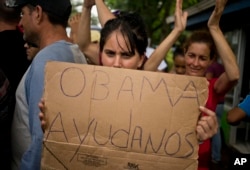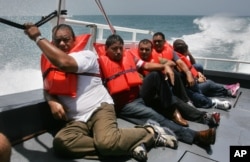U.S. President Barack Obama has ended a controversial policy that let any Cuban who steps foot on U.S. soil remain in the United States without a visa and become a legal resident.
"Cuban nationals who attempt to enter the United States illegally and do not qualify for humanitarian relief will be subject to removal, consistent with U.S. law and enforcement priorities," Obama said in a statement Thursday. "By taking this step, we are treating Cuban migrants the same way we treat migrants from other countries."
Thursday's repeal of the 22 year-old so-called "wet foot, dry foot" policy required Cubans who were caught at sea trying to reach the U.S. to return home, but allowed those who reached land to stay and eventually obtain legal residential status.
The repeal effectively guts the Cuban Adjustment Act of 1966, which presumed Cuban migrants were political refugees who required protection. The act allowed those who remained in the U.S. for more than a year to become eligible for legal residency.
Cubans who are concerned they will be persecuted upon return to the island nation will still be allowed to apply for political asylum when they reach the U.S.
WATCH: White House spokesman explains decision to change policy
Not surprised
Average Cubans and opponents of the island's communist leaders said they expected repeal of the law that siphoned off the island's most dissatisfied citizens and turned them into sources of remittances supporting relatives who remained on the island.
“This law, originated to protect Cuban political exiles, had become a means of abuse that helped people to defraud the United States government,” said Jose Azel, a senior scholar at the University of Miami’s Institute of Cuban and Cuban-American studies.
“This is a decision that was expected,” Azel said in a Friday interview with VOA’s Spanish Service. However, he noted, “no one thought that it would be taken” in the last week of the Obama administration. “Even if you don't like it, [it] is part of the unilateral concessions” the president made with Cuba.
Lorena Pena, who is four months pregnant and left Cuba four months ago on a journey to the U.S. with her husband and four-year-old daughter, is now staying in a Catholic shelter in Panama City. "We feel sadness because we are all coming with a dream that comes from pain, hunger and a lot of work to get this far," she said.
Clinton policy
Former President Bill Clinton approved the "wet foot, dry foot" policy in 1995, when Cubans who were returned home after trying to escape were subjected to harsh treatment and more repression.
Cuba had long complained that the policy encouraged Cubans to put their lives at risk trying to get to the U.S. across the sometimes dangerous Straits of Florida.
Geoff Thale, head of the Washington Office on Latin America, praised Obama's decision Thursday, saying the policy had given Cubans an advantage over other Latin Americans who are trying to escape violence and poverty in Central America.
Thale calls the new rules a "positive step toward a more sensible Cuban immigration policy."
But New Jersey Senator Bob Menendez, a Democrat whose parents were Cuban immigrants, said Thursday's announcement "will only serve to tighten the noose the Castro regime continues to have around the neck of its own people."
VOA's Spanish Service contributed to this report, some material came from the Associated Press









